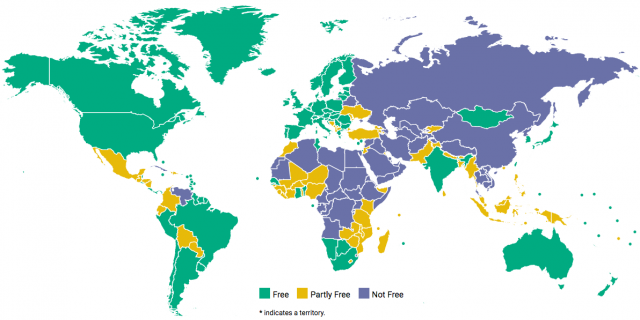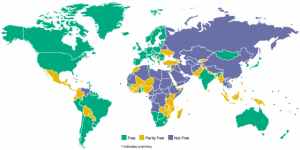Freedom House: Georgia is Leader in Fighting Corruption among Post-Soviet Countries
The Freedom House organization has released a detailed report about Georgia, after publishing its annual report called "Nations in Transit 2017 - The False Promise of Populism" in early April. The report said that Georgia’s rating has remained the same since the previous survey.
The author of the report on Georgia is Michael Hikari Cecire, a fellow at New America and the Foreign Policy Research Institute, and the cofounder of the Tbilisi-based Georgian Institute of Politics. Cecire emphasized that Georgia has become a leader in the non-Baltic former Soviet Union in combatting corruption.
“Intensive reforms and anti-graft efforts during the UNM’s time in power from 2004 to 2012 resulted in major gains against petty corruption and organized crime,” the report reads.
The report noted that Transparency International’s 2016 Global Corruption Barometer showed that petty corruption in Georgia remained extremely low, with corruption named as one of the top three problems facing the country by only 12 percent of the population, the fourth-lowest number of the 42 European and Central Asian assessed.
As for nepotism, the report reads that it remains an area of potential concern in Georgia. “Legislation to criminalize nepotism in the civil service proposed in 2015 has not moved forward,” the report said.
The detailed report also assesses the period of 2016 parliamentary elections. “Georgia’s democratic development continued its recent positive trajectory, although progress stalled or even regressed along certain lines.”
While monitors described the elections as mostly free and fair, instances of pre-election and election day violence cast a pall over the process. “Running as a party instead of a coalition, GD won a super-majority of 114 out of 150 seats, with which two independent MPs will also align,” the report says, naming the parliamentary elections as the most important event of the last year.
As for the civil sector and media environment, the report says that civil society in Georgia is strong and active and “Georgian non-governmental organizations (NGOs) play a major role in policy research, advocacy, and opinion leadership.”
Cecire says that the Georgian media is generally vibrant, pluralistic, and free. “International organizations describe media freedom in Georgia as mostly strong, and the media sector benefits from a reasonably robust legal framework and significant pluralism,” he said, but added that the ongoing legal battle over the fate of Rustavi2, a popular, opposition-aligned television channel, “has cast a pall over improvements in the overall environment.”
The report says that the functioning of the judiciary has improved since the transfer of power following the 2012 parliamentary elections. However, the it also says that there remain widespread concerns over judicial independence and the operation of the judiciary, adding that “high-profile court cases continue to raise serious questions about the independence and politicization of the judiciary.”
The 2017 Freedom House ratings reflect the period from January 1 through December 31, 2016, and the democracy scores and regime ratings are based on a scale of 1 to 7, with 1 representing the highest level of democratic progress and 7 the lowest.
Georgia has received 4.61 score overall and has been put in the category of transitional governments.
By Thea Morrison












